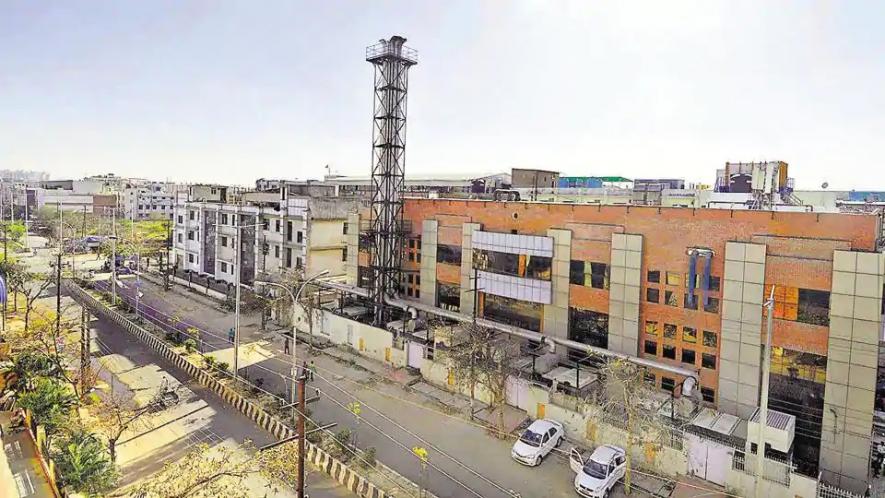200 Workers Sacked Without Notice: Impact of Modi Government’s “Ease of Doing Business” Promise?

Image for representational use only. Image Courtesy: Hindustan Times
On November 29, around 200 workers of a Chinese smartphone manufacturing unit, Hipad Technology India, were “sacked” without any prior notice. The workers were reportedly caught unaware, as they were barred from punching into the biometric system (to mark attendance), and were instead asked to leave. The development resulted in agitated workers resorting to violence. Reports suggest that nearly 1,200 disgruntled workers including the sacked ones, pelted stones, and barged into the factory in Noida Sector 63. As the incident gathered steam, police were alerted, and force was deployed at the site.
As per the sources, the workers were employed on a contractual basis following which they were directly asked to leave without any explanation. The Assistant Labour Commissioner Harish Chandra Singh told PTI, “The vendor had possibly not informed the workers. That is why they kept coming to work which apparently led to this misunderstanding. The office asked them to leave the premises, and the workers said they were not informed about the decision, and were being sacked. That is why they resorted to violence.” The company, Oppo, has responded by saying that the workers were “independent entities”, and were not related to the Oppo.
“We would like to clarify that the organization in question and its workers mentioned in the reports are independent entities not related to OPPO. India has deep respect for our employees and have always held them in the highest of regards. We have and will continue to take decisions keeping in mind the best interest of our employees,” the company said. Commentators say that companies like Oppo or Xiaomi out-contract their work to such Indian companies precisely so that they can claim that these guys are “independent”, and thus wash their hands off. It should be noted that Xiaomi is the largest selling smartphone brand in India.
Recently, in July, while speaking at the opening of the world’s largest mobile phone manufacturing facility in the outskirts of Delhi, Modi had called India “a global hub of manufacturing”. Boasting about the “Make in India” initiative, Modi had termed “India as world’s second-largest manufacturer of mobile phones.” Workers employed on contractual basis have increased by 13 per cent during the period between 1999 and 2010. As per a recent report, “Contract workers increased from 12 per cent of all registered manufacturing workers in 1999 to over 25 per cent in 2010.”
In September, 10 central trade unions called for a nation-wide general strike on January 8 and 9, 2019 to protest against the anti-worker policies of the Modi government including widespread job cuts and unemployment caused by the labour reforms. Previously, Yamaha workers had been on a strike following the illegal termination of two workers.
Abhishek, from All India Central Council of Trade Unions (AICCTU) told Newsclick, “This is the standard practice of the companies, where they hire and fire. This Oppo incident is one such case. When the demand of production is high, companies hire additional workers, and once the demand subsides, they sack workers without even letting them know. This is a clear case of exploitation of labour. Until now, this practice is de facto for contractual workers, but the corporates want it to extend to the entire work force. And the structures which are meant to protect workers are supporting the employers. This is the sad state.”
Observers believe that the promise of “ease of doing business” by the Modi government has legitimised and diluted several labour laws, allowing companies to openly exploit workers. Meanwhile, three to four workers have been picked up for questioning by the police. As per the sources, an FIR was lodged yesterday, and no worker came to work today.
Commentators believe that the promise of “ease of doing business” by the central government has made it easier for the employers to fire labourers. They believe that the ‘Fixed Term Employment’ which has been extended to all sectors has boosted seasonal hiring and firing. Under FTE, the workers are hired for a fixed period. Their services automatically end, as the duration is over. They employers also have the power to terminate the contract before the specified period citing grounds like low performance, fraud and others.
Get the latest reports & analysis with people's perspective on Protests, movements & deep analytical videos, discussions of the current affairs in your Telegram app. Subscribe to NewsClick's Telegram channel & get Real-Time updates on stories, as they get published on our website.
























